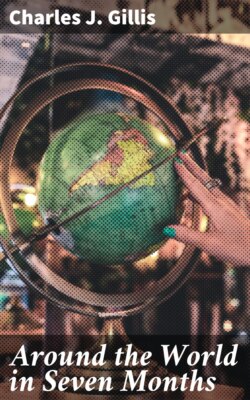Читать книгу Around the World in Seven Months - Charles J. Gillis - Страница 5
На сайте Литреса книга снята с продажи.
CHAPTER III.
TOKIO.
ОглавлениеTable of Contents
Tokio, Japan, Oct. 15, 1889.
AFTER being entertained at Yokohama, on the morning of the 14th instant, with a slight earthquake, we left for this, the capital city of the Empire, on a finely built and equipped, narrow-gauge (3 ft. 6 in.) railroad. Every square yard of the country we traversed was cultivated in the highest degree—Distance eighteen miles, time one hour.
I noticed that the locomotives, cars, and all the equipments about the railroad were of English manufacture from Manchester and Birmingham. I was informed that most of the twelve hundred miles of railroads in Japan were owned and run by the Government. The chief in charge is a native educated in England, who scouted the idea that any other country could produce any thing fit to be used on railroads.
We had previously engaged rooms at one of the two hotels in the city, where foreigners are entertained, and after an excellent dinner, took jinrickishas, of which there are 80,000 in this city, and had a long run through the interminable streets. The city has a population of 1,600,000 and covers a space of thirty-six square miles, the streets being very narrow and the houses mostly of wood, one and two stories high—the stores all small.
After passing through streets for some miles, we came to others, wider and lighted brilliantly by gas and electricity, through which carriages were not allowed to pass. The houses, for miles, were occupied as tea-houses, and were brilliantly illuminated, like the gin palaces of London, or the whiskey saloons of America. Great vans were passing along, on which dancing and theatrical performances were going on. There were also a good many theatres in active operation.
One of the evenings that we were in the city, these streets were occupied by an immense annual flower show, one of the features of which was a big elephant constructed of chrysanthemum flowers of many colors. The effect was very gorgeous.
The next day we spent going about the great city and seeing its wonders, chief of which is the Mikado's palace and grounds. I called on the American Minister and asked him to get me a permit to go into the palace, but he said it was impossible, no foreigners being allowed in the palace or the grounds. The palace and gardens looked like immense fortifications, being surrounded by three moats, each a hundred feet wide, and filled with water, and by three stone walls, each thirty or forty feet high.
The palace is in the heart of the city, and I should say the grounds were two hundred acres in extent, all, including the neighboring streets, being lighted by the New York Edison Company. I saw the superintendent who had charge of the construction of the plant, who said it took them a year to do it.
The women to be seen in the streets and tea-houses are invariably small and very pretty, except some of the married ones, who have their teeth colored black in accordance with an ancient custom, which makes them look hideous.
It is very cool in this part of Japan at this season. There is not sufficient frost to affect the crops, but one gets cold riding about—and there is no efficient method of heating the houses. There is no coal used for domestic purposes, and wood is very scarce and high. If you ask for a fire, at most hotels, they bring you a copper pan containing ignited charcoal covered with ashes, which does about as much good as a kerosene lamp. I suffer greatly with the cold, and would be glad to pay a large price for a pair of Arctic overshoes.
The price of newspapers, printed in the English language, at Yokohama is twenty-five cents a copy, or thirty dollars per annum. They have very little news, and almost none from America.
We went through the museum, and saw many extraordinary curiosities of ancient and modern Japan. Among them was a stuffed rooster in a glass case, whose tail feathers were ten feet long. I thought there was some humbug about it, but I afterwards saw a live one with tail feathers twelve feet long.
The public buildings are modern, large, and handsome, and the people very polite and good-natured. The streets are narrow. Great crowds are everywhere. It seems to me that I must have seen a hundred thousand people to-day. Every thing about the city is strange, often disagreeable and offensive. A couple of days in it is quite sufficient, and I shall be very glad to go away to-morrow.
